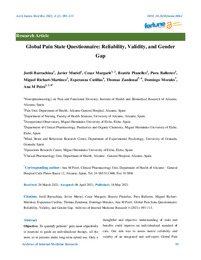Title:
Global Pain State Questionnaire: Reliability, Validity, and Gender Gap |
Authors:
Barrachina, Jordi
Muriel, Javier 
Margarit, César
Planelles, Beatriz
Ballester, Pura 
Miguel, Richart-Martínez 
Cutillas, Esperanza 
Zandonai, Thomas
Peiró, Ana  |
Editor:
Fortune Journals |
Department:
Departamentos de la UMH::Farmacología, Pediatría y Química Orgánica |
Issue Date:
2021-05 |
URI:
https://hdl.handle.net/11000/32339 |
Abstract:
Objective: To quantify patients’ pain more objectively is essential to guide an individualized therapy, all the more so in patients under long-term opioid-use. Only a thoughtful and objective understanding of risks and benefits could improve an individualized standard of care. Our aim was to assess metric reliability and validity of an integrated and self-report Global Pain Status questionnaire to quantify the impact of pain on patient’s health in a more precise manner. Methods: A cross-sectional study was conducted to analyse the reliability, agreement, and validity of an integrated questionnaire compared to isolated scales, due to kappa statistics, intra- class and other correlation coefficients. Level of pain (intensity and relief), quality of life, most prevalent analgesic adverse events and hospital frequentation were registered in a total of 38 cases (pain unit patients) and 52 painless matched-controls.. A reduced multitrait-multimethod matrix and a canonical-correlation analysis were developed together with a multiple linear regression. Results: Cases (56 ± 10 years old, 63% females, pain intensity 66 ± 23 mm, incidence rate of 5 adverse events) represented a regular pain population. A high intraobserver correlation (r0.75- 0.88, weighted-κ 0.41–0.51, unweighted-κ 0.66-0.82) was evidenced together with significant correlation coefficients in test-retest reliability, and for validity, even more, in a reduced multitrait-multimethod matrix (>0.8) and canonical-correlation (>0.95). A gender gap was evidenced in cases’ companions, mostly middle-aged females (78%), who experienced negative effects on their health. Conclusions: The Global Pain Status questionnaire is an evaluation instrument with enough reliability and validity, being a low-cost method to determine the multidimensional pain management at clinical routine. A gender-gap within pain caregivers was found that affect their health outcomes. Support interventions for pain patients’ companions should consider specific gender risk factors.
|
Keywords/Subjects:
Reliabilit
Validity
Chronic Pain
Gender
Analgesic Response |
Knowledge area:
CDU: Ciencias aplicadas: Medicina: Farmacología. Terapéutica. Toxicología. Radiología |
Type of document:
info:eu-repo/semantics/article |
Access rights:
info:eu-repo/semantics/openAccess |
DOI:
https://doi.org/10.26502/aimr.0061 |
Published in:
Archives of Internal Medicine Research. 2021, 4(2): 91-113 |
Appears in Collections:
Artículos Farmacología, Pediatría y Química Orgánica
|

.png)
